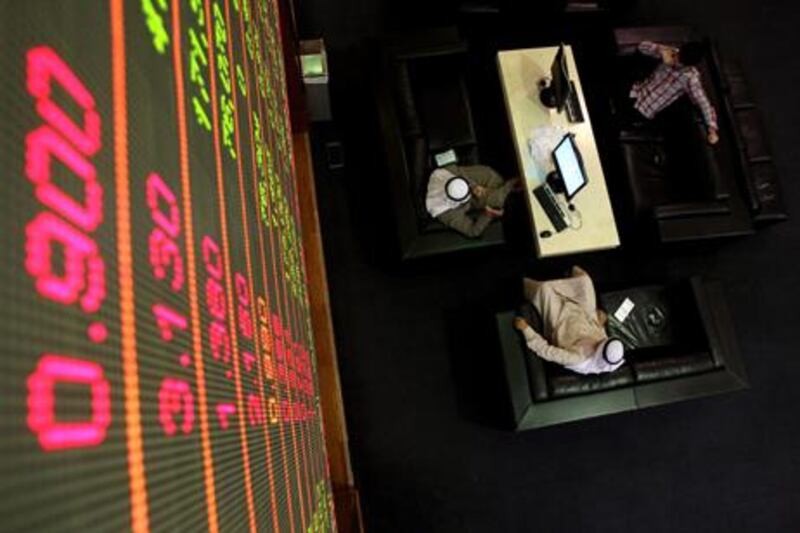Equity markets in the UAE fell yesterday as investors cut their exposure to risk in Egypt amid growing political tension across the north African country.
Dubai's main index declined the most during a single session in more than a year as Hosni Mubarak, the president of Egypt, faced further demonstrations.
The Dubai Financial Market General Index closed down 4.3 per cent at 1,534.02 points, having fallen as much as 6 per cent earlier in the day. The Abu Dhabi Securities Exchange General Index ended down 3.7 per cent at 2,561.06 points.
Egypt's stock market was closed yesterday as crowds of protesters took to the streets of Cairo for a sixth day of demonstrations against Mr Mubarak's regime.
Trading is expected to be suspended again today, after a tumultuous week on the market that pushed the index down 16 per cent. The EGX 30 Index closed down 10.5 per cent at 5,646.50 on Thursday.
"Foreign appetite to the region will subside in the short term," said Hassan el Salah, the head of institutional trading at AlRamz Securities. He said yesterday's negative reaction was "no surprise" and more volatility was anticipated as events unfold.
Egypt's economy, the largest in north Africa, had been a bright spot for foreign investment partly because of the country's inclusion on the MSCI Emerging Markets Index.
The index is one of the most widely used measurements of the performances of emerging equity markets and plays an important role in attracting institutional and regional traders.
"Some foreign investors are naturally saying they'd rather not take the risk [of investing in the region] and feel better waiting to see how far this [unrest] will spread. It's quite a normal reaction [and] a requirement for clarity," said Ann Wyman, the head of emerging markets at Nomura.
She said the reaction to Egypt's political unrest had been more pronounced than that following Tunisia's so-called "Jasmine Revolution" this month because of Egypt's economic prominence in the Mena region.
"It's the size that matters. Egypt's role in the Middle East is pivotal," Ms Wyman said, referring to potential disruption to trade on the Suez Canal, which led global markets to close in negative territory on Friday.
Total foreign direct investment into the country last year fell to US$6 billion (Dh22.03bn) after hitting a high of more than $8bn a year ago. Nomura said it expected foreign direct investment to "suffer a further blow", although other industry experts were optimistic about Egypt's economy potentially forming the bedrock of recovery in the EGX 30 Index.
There are still opportunities in Egypt, said Sven Richter, the head of frontier markets at Renaissance Asset Managers.
"When it dies down … a much calmer period will come to the fore and unless the government doesn't take a market-friendly approach, [Egyptian] companies will be pretty resilient," he said.
Markets elsewhere in the Gulf, where many firms have interests in Egypt, were also shaken on developments in the world's most populous Arab nation.
Qatar's measure closed almost 3 per cent down at 8,709.77 after it fell the most since December 2009 during the day's trading. Oman's index also retreated by 3 per cent to 6,731.77 points, while Bahrain and Kuwait registered less severe losses of 1.4 per cent and 1.7 per cent, respectively.
But Saudi Arabia's Tadawul All-Share Index was the only one to rise in the GCC, as it gained 2.5 per cent to 6,421.97 points, reversing a 6.4 per cent fall on the first day of trading on Saturday as the repercussions of events in Egypt were priced in.
"It's predominantly local-driven buying in Saudi," said Julian Bruce, the director of equity sales for EFG-Hermes.
He said the low level of foreign activity in the kingdom was advantageous as the country was less affected by outflows of foreign investors.






